| |
| Niceno-Constantinopolitan Creed |
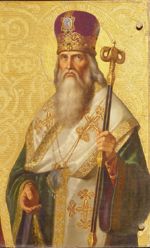
Saint Tarasius 730-806
Patriarch of Constantinople
25 XII 784 to 25 II 806
(Icon by I.K. Dorner) |
|
|
|
|
|
| |
ελληνικά
(using plural form) |
Latin |
English
|
Церковнославянский Язык |
Πιστεύω εἰς ἕνα Θεόν, Πατέρα, Παντοκράτορα, ποιητὴν οὐρανοῦ καὶ γῆς, ὁρατῶν τε πάντων καὶ ἀοράτων.
Καὶ εἰς ἕνα Κύριον Ἰησοῦν Χριστόν, τὸν Υἱὸν τοῦ Θεοῦ τὸν μονογενῆ, τὸν ἐκ τοῦ Πατρὸς γεννηθέντα πρὸ πάντων τῶν αἰώνων·
φῶς ἐκ φωτός, Θεὸν ἀληθινὸν ἐκ Θεοῦ ἀληθινοῦ, γεννηθέντα οὐ ποιηθέντα, ὁμοούσιον τῷ Πατρί, δι' οὗ τὰ πάντα ἐγένετο.
Τὸν δι' ἡμᾶς τοὺς ἀνθρώπους καὶ διὰ τὴν ἡμετέραν σωτηρίαν κατελθόντα ἐκ τῶν οὐρανῶν καὶ σαρκωθέντα
ἐκ Πνεύματος Ἁγίου καὶ Μαρίας τῆς Παρθένου καὶ ἐνανθρωπήσαντα.
Σταυρωθέντα τε ὑπὲρ ἡμῶν ἐπὶ Ποντίου Πιλάτου, καὶ παθόντα καὶ ταφέντα.
Καὶ ἀναστάντα τῇ τρίτῃ ἡμέρᾳ κατὰ τὰς Γραφάς.
Καὶ ἀνελθόντα εἰς τοὺς οὐρανοὺς καὶ καθεζόμενον ἐκ δεξιῶν τοῦ Πατρός.
Καὶ πάλιν ἐρχόμενον μετὰ δόξης κρῖναι ζῶντας καὶ νεκρούς, οὗ τῆς βασιλείας οὐκ ἔσται τέλος.
Καὶ εἰς τὸ Πνεῦμα τὸ Ἅγιον, τὸ κύριον, τὸ ζωοποιόν,
τὸ ἐκ τοῦ Πατρὸς ἐκπορευόμενον,
τὸ σὺν Πατρὶ καὶ Υἱῷ συμπροσκυνούμενον καὶ συνδοξαζόμενον,
τὸ λαλῆσαν διὰ τῶν προφητῶν.
Εἰς μίαν, Ἁγίαν, Καθολικὴν καὶ Ἀποστολικὴν Ἐκκλησίαν.
Ὁμολογῶ ἓν βάπτισμα εἰς ἄφεσιν ἁμαρτιῶν.
Προσδοκῶ ἀνάστασιν νεκρῶν.
Καὶ ζωὴν τοῦ μέλλοντος αἰῶνος.
Ἀμήν. |
Credo in unum Deum, Patrem omnipotentem, factorem cæli et terræ, visibilium omnium, et invisibilium.
Et in unum Dominum Iesum Christum, Filium Dei unigenitum.
Et ex Patre natum ante omnia sæcula.
Deum de Deo, lumen de lumine, Deum verum de Deo vero.
Genitum, non factum, consubstantialem Patri: per quem omnia facta sunt.
Qui propter nos homines et propter nostram salutem descendit de cælis.
Et incarnatus est de Spiritu Sancto ex Maria Virgine, et homo factus est.
Crucifixus etiam pro nobis sub Pontio Pilato; passus et sepultus est.
Et resurrexit tertia die, secundum Scripturas.
Et ascendit in cælum, sedet ad dexteram Patris.
Et iterum venturus est cum gloria, iudicare vivos et mortuos, cuius regni non erit finis.
Et in Spiritum Sanctum, Dominum et vivificantem: qui ex Patre Filioque procedit.
Qui cum Patre et Filio simul adoratur et conglorificatur: qui locutus est per prophetas.
Et unam sanctam catholicam et apostolicam Ecclesiam.
Confiteor unum baptisma in remissionem peccatorum.
Et exspecto resurrectionem mortuorum.
Et vitam venturi sæculi. Amen.
|
I believe in one God,
the Father almighty,
maker of heaven and earth,
of all things visible and invisible.
I believe in one Lord Jesus Christ,
the Only Begotten Son of God,
born of the Father before all ages.
God from God, Light from Light,
true God from true God,
begotten, not made, consubstantial with the Father;
through him all things were made.
For us men and for our salvation
he came down from heaven,
and by the Holy Spirit was incarnate of the Virgin Mary,
and became man.
For our sake he was crucified under Pontius Pilate,
he suffered death and was buried,
and rose again on the third day
in accordance with the Scriptures.
He ascended into heaven
and is seated at the right hand of the Father.
He will come again in glory
to judge the living and the dead
and his kingdom will have no end.
I believe in the Holy Spirit, the Lord, the giver of life,
who proceeds from the Father and the Son,
who with the Father and the Son is adored and glorified,
who has spoken through the prophets.
I believe in one, holy, catholic and apostolic Church.
I confess one Baptism for the forgiveness of sins
and I look forward to the resurrection of the dead
and the life of the world to come. Amen. |
Вѣрую во единаго Бога Отца Вседержителя, Творца небу и земли, видимымъ же всѣмъ и невидимымъ.
И во единаго Господа Іисуса Христа, Сына Божія, Единороднаго, Иже отъ Отца рожденнаго прежде всѣхъ вѣкъ: Свѣта отъ Свѣта, Бога истинна отъ Бога истинна, рожденна, несотворенна, единосущна Отцу, Имъ же вся быша. Насъ ради человѣкъ и нашего ради спасенія сшедшаго съ небесъ и воплотившагося отъ Духа Свята и Маріи Дѣвы и вочеловѣчшася. Распятаго же за ны при Понтійстемъ Пилатѣ, и страдавша, и погребенна. И воскресшаго въ третій день по писаніемъ. И восшедшаго на небеса, и сѣдяща одесную Отца. И паки грядущаго со славою судити живымъ и мертвымъ. Его же Царствію не будетъ конца.
И въ Духа Святаго, Господа, животворящаго, Иже отъ Отца исходящаго, Иже со Отцемъ и Сыномъ спокланяема и славима, глаголавшаго пророки.
Во едину Святую, Соборную и Апостольскую Церковь. Исповѣдую едино крещеніе во оставленіе грѣховъ. Чаю воскресенія мертвыхъ. И жизни будущаго вѣка. Аминь |
|
|
| |
sufficientem scientiam salutarem – sufficient knowledge for salvation |
|
| |
ἐκπορεύεσθαι
προϊέναι
procedere |
|
| |
As with this entire website, this webpage dealing with the weighty issue of the Filioque is a work in progress,
But particularly, this webpage should be understood by the reader as being nothing more than a placeholder. |
|
| |
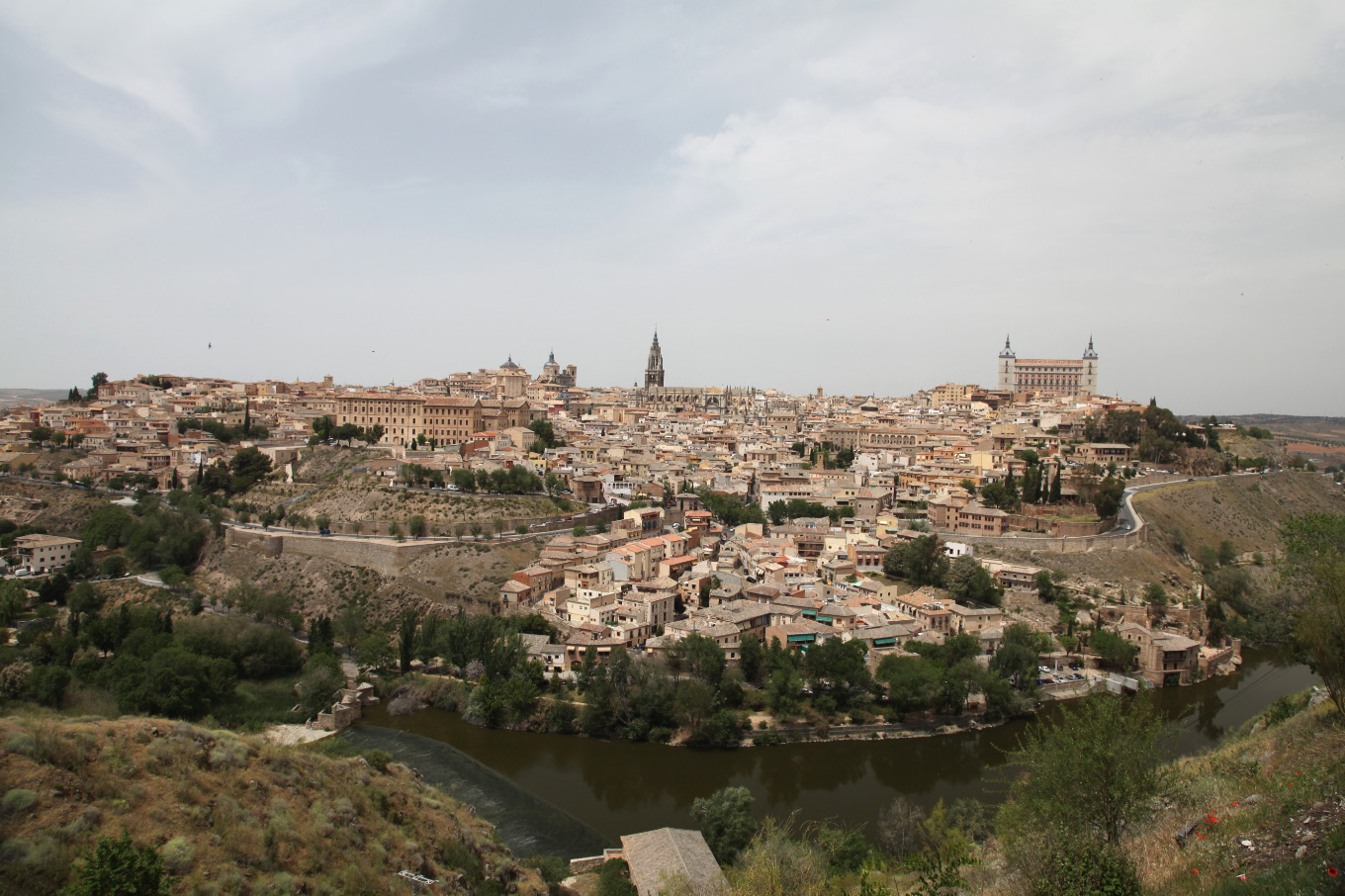 |
|
| |
Toledo in Spain. |
|
| |
Dydd Gŵyl Dewi Sant – Saint David, Patron Saint of Wales, also venerated in the Orthodox Church, reposed in the Lord on 1 March 589. |
|
| |
The question of the Procession of the Holy Spirit and the Filioque controversy has been analyzed and debated by the greatest minds in all of Christendom for more than a millennium, and writings touching on the underlying subject go back much further still. Perhaps not one Orthodox-Catholic Christian from ten thousand possesses the beginnings of an understanding of what the discussion is about, though there are libraries full of writings on the subject going back that same thousand years and more, and each decade in our own time sees its new installment of monographs and other contributions. (And some attempt will be made here to reproduce the Biblical and some of the Patristic statements on the subject, which attempt will not, of course, resolve the controversy but will, it is hoped, provide some frame to its complexity.)
Since it first appeared inserted into the Niceno-Constantinopolitan Creed, perhaps following a local Church Council in Toledo, Spain in the year 589, the Filioque and the procession of the Holy Spirit have been a principal point of disagreement among the best and holiest writers of Christendom, and for much of the Middle Ages this question was thought to lie at the heart of the Great Schism, conventionally dated to 1054, though in the Twenty-First Century virtually all specialists and Church hierarchs understand that questions of authority at the universal level within the Church, Papal Primacy and related matters, are overwhelmingly at the center of the ongoing schism within the Orthodox-Catholic Church, with the Catholic Church on one side and the Orthodox and Oriental Orthodox Churches on the other.
Indeed questions of authority within the Church to a great extent swallow up the Filioque controversy, as the question of, "Who Decides?" would plaque a truly Ecumenical Council, if one could be brought about, and if fraternal unanimity did not seem in that council to be developing around the question of the procession of the Holy Spirit. Given the weight of authority involved in this debate stretching back nearly to Apostolic times, and the ossification of the "two" positions within the context of schism, that such fraternal unanimity would suddenly emerge is not to be expected.
Of course there is another possibility.
Given the enormous complexity of the subject, its importance, touching as it does on Trinitarian theology, and the fact that "both" sides of the controversy can be presented in such convincing ways, it would be possible for the Catholic Church and the Orthodox and Oriental Orthodox Churches to enter again into Full Communion and "Heal the Schism Now", remove the Filioque from the Latin rendition of the Niceno-Constantinopolitan Creed and from all vernaculars, as indeed Pope John Paul II already decreed be done with the Creed rendered in the original Greek within Greek-language particular Churches which are already part of the Full Communion of the Catholic Church, while leaving the high theological question of the procession of the Holy Spirit for another day and age, to be resolved by an Ecumenical Council at a time much further in the future, or indeed to remain unresolved and within the holy realm of theologumenon (theological opinion) until the Parousia. |
|
| |
|
|
| |
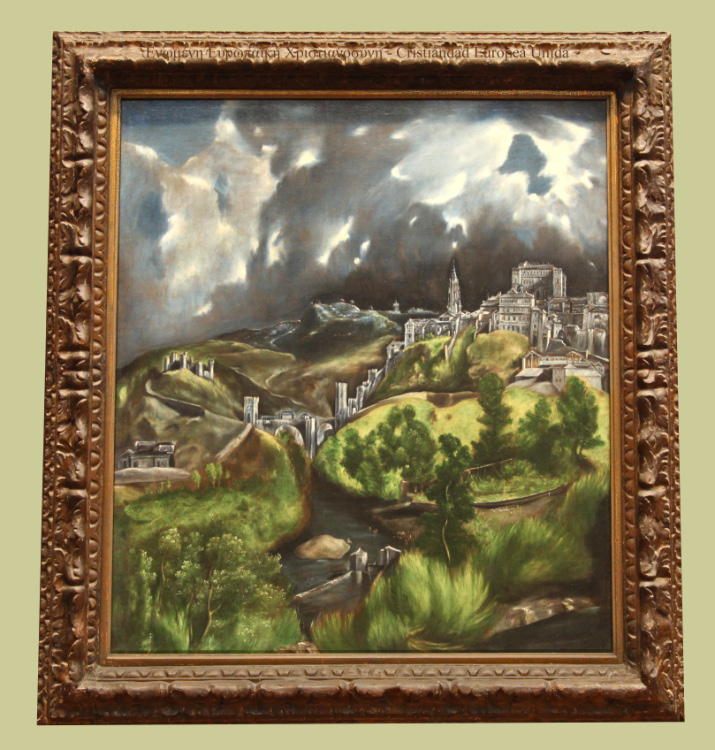 |
|
| |
Vista de Toledo - View of Toledo, painting by El Greco in the MMA, NYC
Δομήνικος Θεοτοκόπουλος - Doménikos Theotokópoulos (* 1541 Crete - Toledo 1614 †)
|
|
| |
|
|
|
| |
Next, I may reasonably turn to those who divide and cut to pieces and destroy that most sacred doctrine of the Church of God, the Divine Monarchy, making it as it were three powers and partitive subsistences and god-heads three. I am told that some among you who are catechists and teachers of the Divine Word, take the lead in this tenet, who are diametrically opposed, so to speak, to Sabellius’s opinions; for he blasphemously says that the Son is the Father, and the Father the Son, but they in some sort preach three Gods, as dividing the sacred Monad into three subsistences foreign to each other and utterly separate. For it must needs be that with the God of the Universe, the Divine Word is united, and the Holy Ghost must repose and habitate in God; thus in one as in a summit, I mean the God of the Universe, must the Divine Triad be gathered up and brought together. For it is the doctrine of the presumptuous Marcion, to sever and divide the Divine Monarchy into three origins,—a devil’s teaching, not that of Christ’s true disciples and lovers of the Saviour’s lessons. For they know well that a Triad is preached by divine Scripture, but that neither Old Testament nor New preaches three Gods.
Equally must one censure those who hold the Son to be a work, and consider that the Lord has come into being, as one of things which really came to be; whereas the divine oracles witness to a generation suitable to Him and becoming, but not to any fashioning or making. A blasphemy then is it, not ordinary, but even the highest, to say that the Lord is in any sort a handiwork. For if He came to be Son, once He was not; but He was always, if (that is) He be in the Father, as He says Himself, and if the Christ be Word and Wisdom and Power (which, as ye know, divine Scripture says), and these attributes be powers of God. If then the Son came into being, once these attributes were not; consequently there was a time, when God was without them; which is most absurd. And why say more on these points to you, men full of the Spirit and well aware of the absurdities which come to view from saying that the Son is a work? Not attending, as I consider, to this circumstance, the authors of this opinion have entirely missed the truth, in explaining, contrary to the sense of divine and prophetic Scripture in the passage, the words, ‘The Lord created me a beginning of His ways unto His works.’ For the sense of ‘He created,’ as ye know, is not one, for we must understand ‘He created’ in this place, as ‘He set over the works made by Him,’ that is, ‘made by the Son Himself.’ And ‘He created’ here must not be taken for ‘made,’ for creating differs from making. ‘Is not He thy Father that hath bought thee? hath He not made thee and created thee?’ says Moses in his great song in Deuteronomy. And one may say to them, O reckless men, is He a work, who is ‘the First-born of every creature, who is born from the womb before the morning star,’ who said, as Wisdom, ‘Before all the hills He begets me?’ And in many passages of the divine oracles is the Son said to have been generated, but nowhere to have come into being; which manifestly convicts those of misconception about the Lord’s generation, who presume to call His divine and ineffable generation a making.
Neither then may we divide into three Godheads the wonderful and divine Monad; nor disparage with the name of ‘work’ the dignity and exceeding majesty of the Lord; but we must believe in God the Father Almighty, and in Christ Jesus His Son, and in the Holy Ghost, and hold that to the God of the universe the Word is united. For ‘I,’ says He, ‘and the Father are one;’ and, ‘I in the Father and the Father in Me.’ For thus both the Divine Triad, and the holy preaching of the Monarchy, will be preserved. |
|
| |
|
Letter of Pope Saint Dionysius (reigned from 22 July 259 to 26 December 268 †) to Saint Dionysius the Great of Alexandria, (reigned as 14th Pope of Alexandria & Patriarch of the See of Saint Mark from 28 December 248 until 22 March 264 †). [emphasis added] |
|
|
Essential Truth |
|
|
Monotheist and Trinitarian
One God in
Three Divine Persons (Hypostases),
Who share One Essence (Ousia - οὐσία),
and so Homoousios - ὁμοούσιος (same in substance),
NOT Homoiousios - ὁμοιούσιος (similar in substance)
(one Iota - Ιώτα, one i — ι — does make the difference).
μία οὐσία, τρεῖς ὑποστάσεις
tres Personae, una Substantia
одна Сущность (Природа), три Ипостаси |
|
Orthodox Christians worship the Father, Son, and Holy Spirit—the Holy Trinity, the one God. Following the Holy Scriptures and the Church Fathers, the Church believes that the Trinity is three divine persons (hypostases) who share one essence (ousia). It is paradoxical to believe thus, but that is how God has revealed himself. All three persons are consubstantial with each other, that is, they are of one essence (homoousios) and coeternal. There never was a time when any of the persons of the Trinity did not exist. God is beyond and before time and yet acts within time, moving and speaking within history.
— Explanation of the Trinity — God is not an impersonal essence or mere "higher power," but rather each of the divine persons relates to mankind personally. Neither is God a simple name for three gods (i.e., polytheism), but rather the Orthodox faith is monotheist and yet Trinitarian. The God of the Orthodox Christian Church is the God of Abraham, Isaac and Jacob, the I AM who revealed himself to Moses in the burning bush.
The source and unity of the Holy Trinity is the Father, from whom the Son is begotten and also from whom the Spirit proceeds. Thus, the Father is both the ground of unity of the Trinity and also of distinction. To try to comprehend unbegottenness (Father), begottenness (Son), or procession (Holy Spirit) leads to insanity, says the holy Gregory the Theologian, and so the Church approaches God in divine mystery, approaching God apophatically, being content to encounter God personally and yet realize the inadequacy of the human mind to comprehend Him.
|
| |
|
|
simply taken from orthodoxwiki.org/Holy_Trinity,
and so too the Catholic Encyclopedia of 1911 on The Blessed Trinity states:
|
| |
|
It is manifest that a dogma so mysterious presupposes a Divine revelation. |
| |
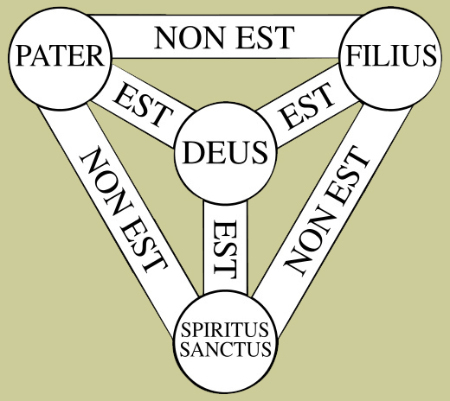 |
|
|
|
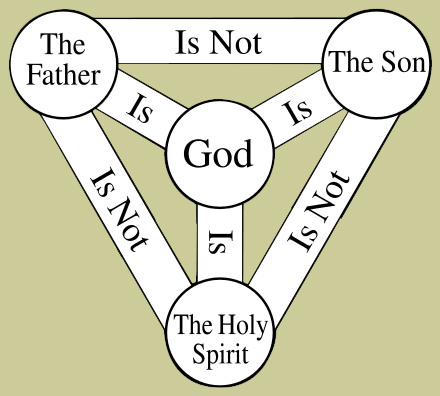 |
|
|
|
|
|
| |
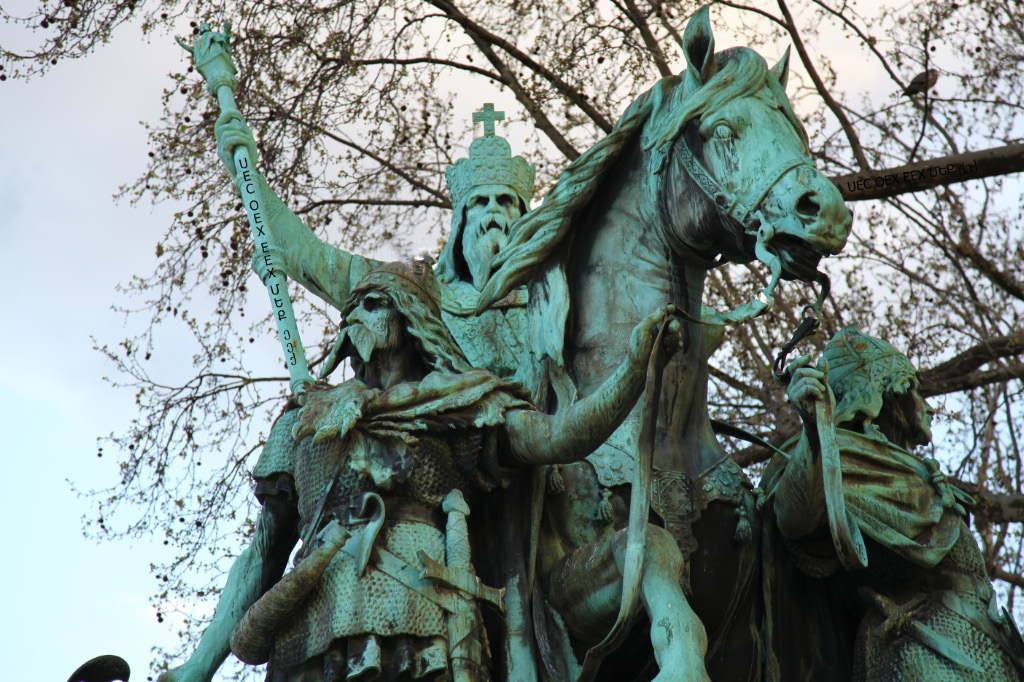 |
|
| |
|
Charlemagne in front of Notre Dame de Paris |
|
|
| |
"At [the Counsel of Florence of 1439] we find a statement which has the value of a historical clarification and at the same time of a doctrinal declaration: 'The Latins state that by saying that the Holy Spirit proceeds from the Father and from the Son they do not mean to exclude that the Father is the source and the principle of all divinity, that is, of the Son and the Holy Spirit. Nor do they wish to deny that the Son learned from the Father that the Holy Spirit proceeds from the Son; nor do they hold that there are two principles or two spirations. Rather they assert that one only is the principle and one only the spiration of the Holy Spirit, as they have asserted up to now' (cf. Conciliorum Oecumenicorum Decreta, Bologna 1973, p. 526) ... The problems on the order of terminology seem thus to be resolved and the intentions clarified, to the extent that each party, the Greeks and the Latins, during the sixth session (July 6, 1439) were able to sign this common definition: 'In the name of the Holy Trinity, Father, Son and Holy Spirit, with the approval of this sacred and universal Council of Florence, we establish that this truth of faith must be believed and accepted by all Christians: and thus all must profess that the Holy Spirit is eternally of the Father and the Son, that he has his existence and his subsistent being from the Father and the Son together, and that he proceeds eternally from the one and from the other as from a single principle and from a single spiration' (DS 1300)." (emphasis added)
|
|
| |
|
Pope John Paul II in General Audience of 7 November 1990 (Note also that in the liturgy the Catholic Church does not add the phrase corresponding to Filioque (καὶ τοῦ Υἱοῦ) to the Greek text of the Creed, even for Greek-language, Latin-Rite Catholics.) |
|
| |
And yet this is the chief reason, except only the question of authority within the Universal Church, why the Church has been divided between East and West for nearly a 1000 years, the basis from which flowed the subsequent divisions in the 16th Century, and which resultant "Protestants" now seem to be further dividing endlessly? This is the reason why in 2010 Eastern Christians -- including prominently laymen, priests and bishops who have never learned 10 words in Greek and could not begin to intelligently discuss the differences between the Latin word procedere and the Greek words ἐκπορεύεσθαι and προϊέναι -- are adding to the Holy Liturgy references to the Catholics being heretics? This is the reason why Christians are so profoundly hindering the work of the Church while killing each other? Well, read on.
|
|
| |
The Father and I are one.
– John 10:30 –
Everything that the Father has is mine...
– John 16:15 – |
|
| |
Now this is how the birth of Jesus Christ came about. When his mother Mary was betrothed to Joseph, but before they lived together, she was found with child through the holy Spirit.
Matthew 1:18
After Jesus was baptized, he came up from the water and behold, the heavens were opened (for him), and he saw the Spirit of God descending like a dove (and) coming upon him. And a voice came from the heavens, saying, "This is my beloved Son, with whom I am well pleased."
Matthew 3:16-17
Then Jesus was led by the Spirit into the desert to be tempted by the devil.
Matthew 4:1
"When they hand you over, do not worry about how you are to speak or what you are to say. You will be given at that moment what you are to say. For it will not be you who speak but the Spirit of your Father speaking through you.
Matthew 10:19-20
"And I will ask the Father, and he will give you another Advocate to be with you always, the Spirit of truth, which the world cannot accept, because it neither sees nor knows it. But you know it, because it remains with you, and will be in you. I will not leave you orphans; I will come to you. In a little while the world will no longer see me, but you will see me, because I live and you will live. On that day you will realize that I am in my Father and you are in me and I in you. Whoever has my commandments and observes them is the one who loves me. And whoever loves me will be loved by my Father, and I will love him and reveal myself to him." Judas, not the Iscariot, said to him, "Master, (then) what happened that you will reveal yourself to us and not to the world?" Jesus answered and said to him, "Whoever loves me will keep my word, and my Father will love him, and we will come to him and make our dwelling with him. Whoever does not love me does not keep my words; yet the word you hear is not mine but that of the Father who sent me. "I have told you this while I am with you. The Advocate, the holy Spirit that the Father will send in my name - he will teach you everything and remind you of all that (I) told you."
John 14:16-26
"When the Advocate comes whom I will send you from the Father, the Spirit of truth that proceeds from the Father, he will testify to me. "
John 15:26
"But I tell you the truth, it is better for you that I go. For if I do not go, the Advocate will not come to you. But if I go, I will send him to you. And when he comes he will convict the world in regard to sin and righteousness and condemnation: sin, because they do not believe in me; righteousness, because I am going to the Father and you will no longer see me; condemnation, because the ruler of this world has been condemned. I have much more to tell you, but you cannot bear it now. But when he comes, the Spirit of truth, he will guide you to all truth. He will not speak on his own, but he will speak what he hears, and will declare to you the things that are coming. He will glorify me, because he will take from what is mine and declare it to you. Everything that the Father has is mine; for this reason I told you that he will take from what is mine and declare it to you."
John 16:7-15
(Jesus) said to them again, "Peace be with you. As the Father has sent me, so I send you."
And when he had said this, he breathed on them and said to them, "Receive the holy Spirit.
Whose sins you forgive are forgiven them, and whose sins you retain are retained."
John 20:21-23
In the first book, Theophilus, I dealt with all that Jesus did and taught until the day he was taken up, after giving instructions through the holy Spirit to the apostles whom he had chosen. He presented himself alive to them by many proofs after he had suffered, appearing to them during forty days and speaking about the kingdom of God. While meeting with them, he enjoined them not to depart from Jerusalem, but to wait for "the promise of the Father about which you have heard me speak; for John baptized with water, but in a few days you will be baptized with the holy Spirit."
Acts 1:1-5 |
|
|
|
|
| |
| As they [Paul, Silas and Timothy] went on their way through the cities, they delivered to them for observance the decisions which had been reached by the apostles and elders who were at Jerusalem [at the Council of Jerusalem, as set forth in Acts 15]. So the churches were strengthened in the faith, and they increased in numbers daily. And they went through the region of Phrygia and Galatia, having been forbidden by the Holy Spirit to speak the word in Asia. And when they had come opposite Mysia, they attempted to go into Bithynia, but the Spirit of Jesus did not allow them; so, passing by Mysia, they went down to Troas [Αλεξάνδρεια Τρωάς – Alexandria Troas, a Hellenistic-Roman city on the Aegean coast in northwest Asia Minor (now Eski Stambul in Turkey)]. |
| |
Acts 16:4-8 |
|
|
|
| |
|
|
| |
|
|
| |
|
|
| |
|
|
| |
|
|
| |
|
|
| |
|
|
| |
When the time for Pentecost was fulfilled, they were all in one place together. And suddenly there came from the sky a noise like a strong driving wind, and it filled the entire house in which they were. Then there appeared to them tongues as of fire, which parted and came to rest on each one of them. And they were all filled with the holy Spirit and began to speak in different tongues, as the Spirit enabled them to proclaim.
Acts 2:1-4
"... this is what was spoken through the prophet Joel: 'It will come to pass in the last days,' God says, 'that I will pour out a portion of my spirit upon all flesh. Your sons and your daughters shall prophesy, your young men shall see visions, your old men shall dream dreams. Indeed, upon my servants and my handmaids I will pour out a portion of my spirit in those days, and they shall prophesy.'"
Acts 2:16-18
Exalted at the right hand of God, he received the promise of the holy Spirit from the Father and poured it forth, as you (both) see and hear. For David did not go up into heaven, but he himself said: 'The Lord said to my Lord, "Sit at my right hand until I make your enemies your footstool."' Therefore let the whole house of Israel know for certain that God has made him both Lord and Messiah, this Jesus whom you crucified." Now when they heard this, they were cut to the heart, and they asked Peter and the other apostles, "What are we to do, my brothers?" Peter (said) to them, "Repent and be baptized, every one of you, in the name of Jesus Christ for the forgiveness of your sins; and you will receive the gift of the holy Spirit.
Acts 2:33-38
While Peter was still speaking these things, the holy Spirit fell upon all who were listening to the word. The circumcised believers who had accompanied Peter were astounded that the gift of the holy Spirit should have been poured out on the Gentiles also, for they could hear them speaking in tongues and glorifying God. Then Peter responded, "Can anyone withhold the water for baptizing these people, who have received the holy Spirit even as we have?" He ordered them to be baptized in the name of Jesus Christ.
Acts 10:44-48
As I began to speak, the holy Spirit fell upon them as it had upon us at the beginning, and I remembered the word of the Lord, how he had said, 'John baptized with water but you will be baptized with the holy Spirit.' If then God gave them the same gift he gave to us when we came to believe in the Lord Jesus Christ, who was I to be able to hinder God?" When they heard this, they stopped objecting and glorified God, saying, "God has then granted life-giving repentance to the Gentiles too."
Acts 11:15-18
Hence, now there is no condemnation for those who are in Christ Jesus. For the law of the spirit of life in Christ Jesus has freed you from the law of sin and death. For what the law, weakened by the flesh, was powerless to do, this God has done: by sending his own Son in the likeness of sinful flesh and for the sake of sin, he condemned sin in the flesh, so that the righteous decree of the law might be fulfilled in us, who live not according to the flesh but according to the spirit. For those who live according to the flesh are concerned with the things of the flesh, but those who live according to the spirit with the things of the spirit. The concern of the flesh is death, but the concern of the spirit is life and peace. For the concern of the flesh is hostility toward God; it does not submit to the law of God, nor can it; and those who are in the flesh cannot please God. But you are not in the flesh; on the contrary, you are in the spirit, if only the Spirit of God dwells in you. Whoever does not have the Spirit of Christ does not belong to him.
Romans 8: 1-9
May the God of hope fill you with all joy and peace in believing, so that you may abound in hope by the power of the holy Spirit. I myself am convinced about you, my brothers, that you yourselves are full of goodness, filled with all knowledge, and able to admonish one another. But I have written to you rather boldly in some respects to remind you, because of the grace given me by God to be a minister of Christ Jesus to the Gentiles in performing the priestly service of the gospel of God, so that the offering up of the Gentiles may be acceptable, sanctified by the holy Spirit. In Christ Jesus, then, I have reason to boast in what pertains to God. For I will not dare to speak of anything except what Christ has accomplished through me to lead the Gentiles to obedience by word and deed, by the power of signs and wonders, by the power of the Spirit (of God), so that from Jerusalem all the way around to Illyricum I have finished preaching the gospel of Christ.
Romans 15:13-19
[B]ut whenever a person turns to the Lord the veil is removed. Now the Lord is the Spirit, and where the Spirit of the Lord is, there is freedom.
2 Corinthians 3:16-1
As proof that you are children, God sent the spirit of his Son into our hearts, crying out, "Abba, Father!"
Galatians 4:6
What difference does it make, as long as in every way, whether in pretense or in truth, Christ is being proclaimed? And in that I rejoice. Indeed I shall continue to rejoice, for I know that this will result in deliverance for me through your prayers and support from the Spirit of Jesus Christ.
Philippians 1:18-19
Concerning this salvation, prophets who prophesied about the grace that was to be yours searched and investigated it, investigating the time and circumstances that the Spirit of Christ within them indicated when it testified in advance to the sufferings destined for Christ and the glories to follow them.
1 Peter 1:10-11 |
|
| |
|
|
| |
From Saint Paul's Letter to Titus |
|
| |
|
|
| |
[B]ut when the goodness and loving kindness of God our Savior appeared, he saved us, not because of deeds done by us in righteousness, but in virtue of his own mercy, by the washing of regeneration and renewal in the Holy Spirit, which he poured out upon us richly through Jesus Christ our Savior, so that we might be justified by his grace and become heirs in hope of eternal life. — Titus 3:4-7 —
|
|
| |
|
|
|
| |
Remind them to be submissive to rulers and authorities, to be obedient, to be ready for any honest work, 2 to speak evil of no one, to avoid quarreling, to be gentle, and to show perfect courtesy toward all men. 3 For we ourselves were once foolish, disobedient, led astray, slaves to various passions and pleasures, passing our days in malice and envy, hated by men and hating one another; but when the goodness and loving kindness of God our Savior appeared, 5 he saved us, not because of deeds done by us in righteousness, but in virtue of his own mercy, by the washing of regeneration and renewal in the Holy Spirit, 6 which he poured out upon us richly through Jesus Christ our Savior, 7 so that we might be justified by his grace and become heirs in hope of eternal life. 8 The saying is sure. I desire you to insist on these things, so that those who have believed in God may be careful to apply themselves to good deeds; these are excellent and profitable to men. 9 But avoid stupid controversies, genealogies, dissensions, and quarrels over the law, for they are unprofitable and futile. |
|
| |
|
Titus 3:1-9 |
|
|